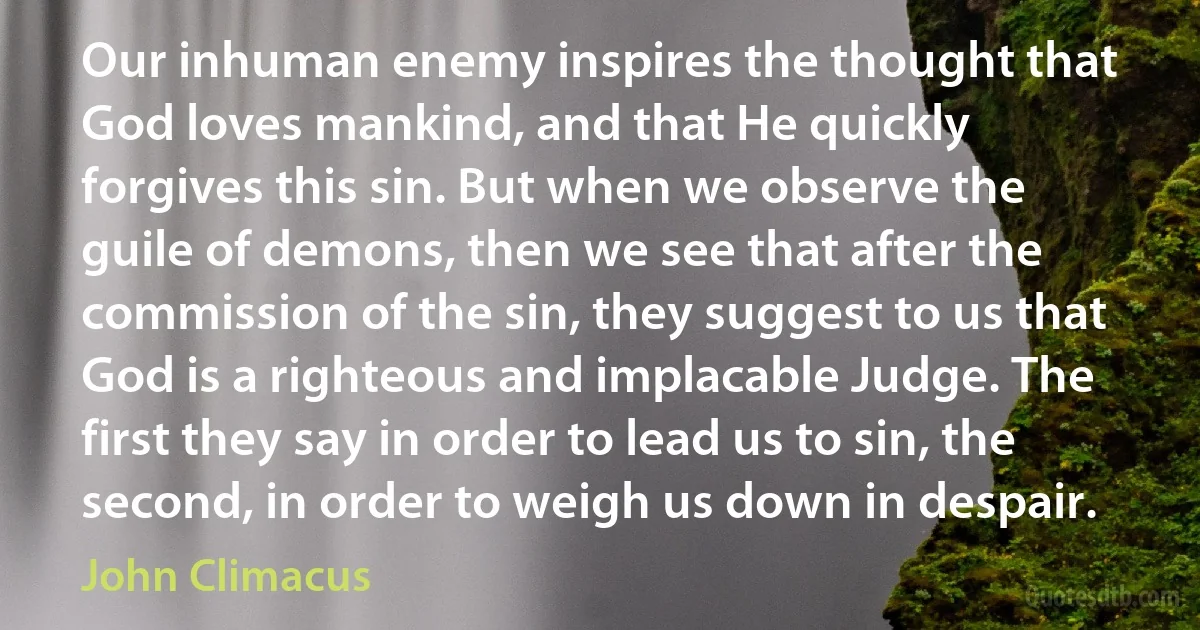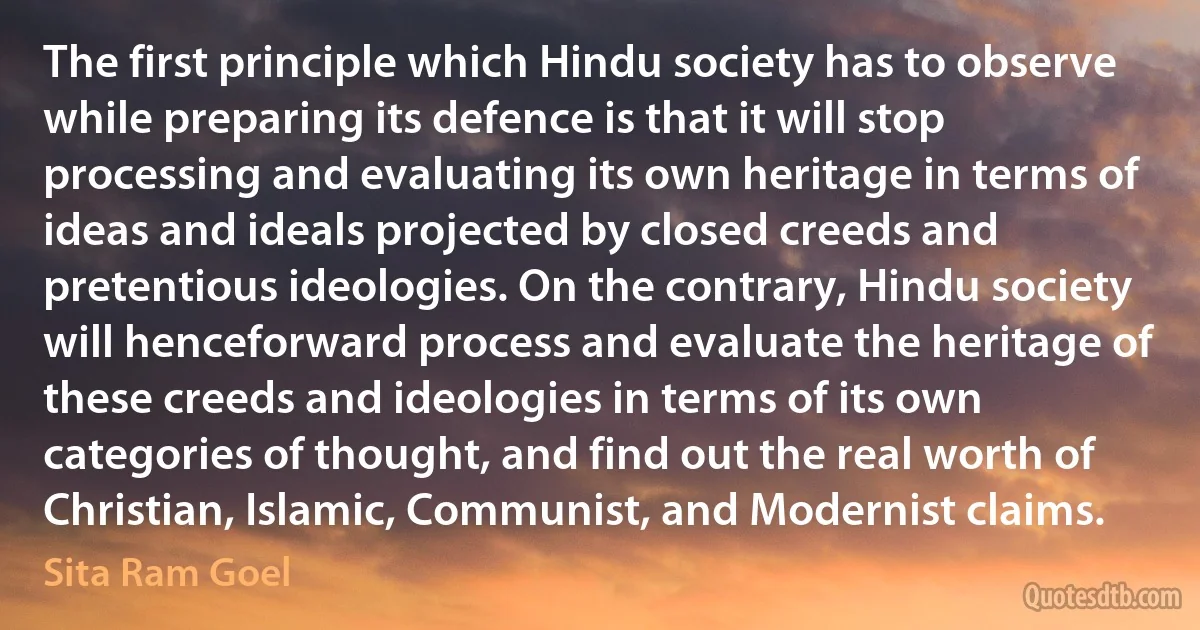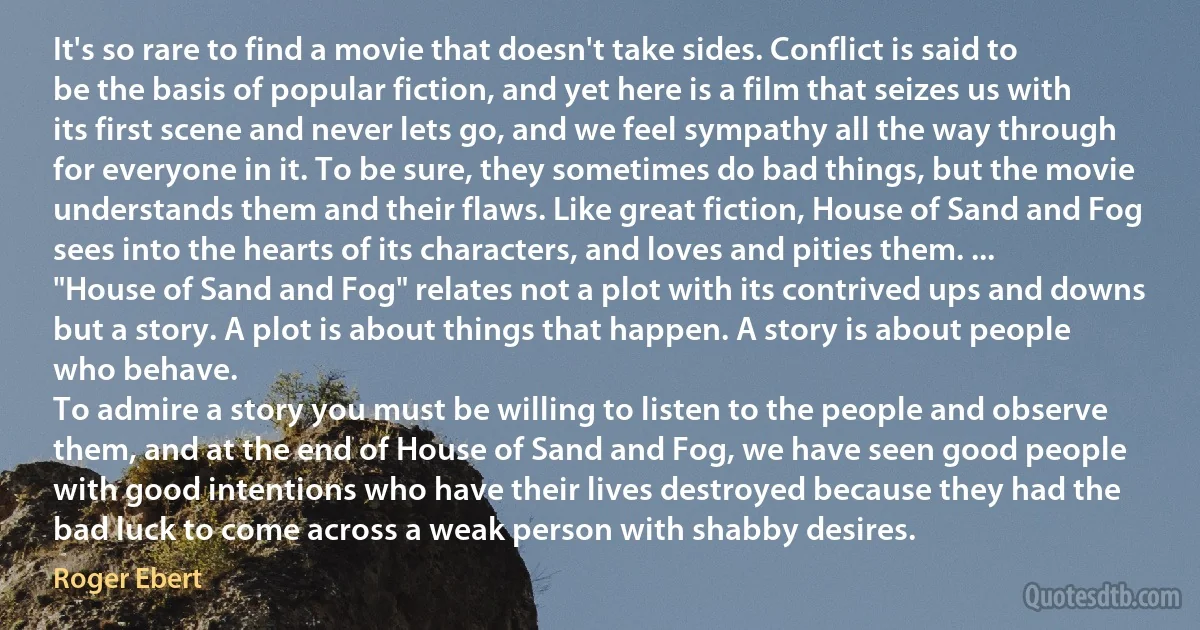Observe Quotes - page 26
Not only should we observe moderation with food, but we must also abstain from every other sin so that just as we fast with our stomach, we should fast with our tongue. Likewise, we should fast with our eyes; i.e. not look at agitating things, not allow your eyes freedom to roam, not to look shamelessly and without fear. Similarly, arms and legs should be restrained from doing any evil acts.

Dorotheus of Gaza
Close your bodily eye, so that you may see your picture first with the spiritual eye. Then bring to the light of day that which you have seen in the darkness so that it may react upon others from the outside inwards. A picture must not be invented but felt. Observe the form exactly, both the smallest and the large and do not separate the small from the large, but rather the trivial from the important.

Caspar David Friedrich
The Eastern Uniate Churches retain ancient habits of worship which are dear to them, and liturgies which in many cases are unintelligible to the faithful. Is not the time to seek similar privileges for Roman Catholics? Will you promote an appeal to the Holy See for the establishment of a Uniate Latin Church which shall observe all the rites as they existed in the reign of Pius IX?

Evelyn Waugh
Those who observe the nature of the Universe and the commandments of the Law, and know their purpose, see clearly God's mercy and truth in everything; they seek, therefore, that which the Creator intended to be the aim of man, viz., comprehension. Forced also by claims of the body, they seek that which is necessary for the preservation of the body, "bread to eat and garment to clothe," and this is very little; but they seek nothing superfluous; with very slight exertion man can obtain it, so long as he is contented with that which is indispensable.

Maimonides
Every specific semiotics (as every science) is concerned with general epistemological problems. It has to posit its own theoretical object, according to criteria of pertinence, in order to account for an otherwise disordered field of empirical data; and the researcher must be aware of the underlying philosophical assumptions that influence its choice and its criteria for relevance. Like every science, even a specific semiotics ought to take into account a sort of 'uncertainty principle' (as anthropologists must be aware of the fact that their presence as observers can disturb the normal course of the behavioral phenomena they observe). Notwithstanding, a specific semiotics can aspire to a 'scientific' status. Specific semiotics study phenomena that are reasonably independent of their observations.

Umberto Eco
It is necessary to have regard to the person whom we wish to persuade, of whom we must know the mind and the heart, what principles he acknowledges, what things he loves; and then observe in the thing in question what affinity it has with the acknowledged principles, or with the objects so delightful by the pleasure which they give him.

Blaise Pascal
Not without a slight shudder at the danger, I often perceive how near I had come to admitting into my mind the details of some trivial affair, - the news of the street; and I am astonished to observe how willing men are to lumber their minds with such rubbish, - to permit idle rumors and incidents of the most insignificant kind to intrude on ground which should be sacred to thought. Shall the mind be a public arena, where the affairs of the street and the gossip of the tea-table chiefly are discussed? Or shall it be a quarter of heaven itself, - an hypæthral temple, consecrated to the service of the gods? I find it so difficult to dispose of the few facts which to me are significant, that I hesitate to burden my attention with those which are insignificant, which only a divine mind could illustrate. Such is, for the most part, the news in newspapers and conversation. It is important to preserve the mind's chastity in this respect.

Henry David Thoreau
Since Biden circa 2022 is often compared to 1970s Jimmy Carter due to a combination of sluggish job approval ratings, unhappy progressive activists, and big-time economic problems (especially inflation), it is germane to observe that Carter managed to soundly defeat Ted Kennedy - the liberal lion of the 1970s and subsequent decades - in the 1980 nomination contest. Are there any Ted Kennedys around right now to mobilize progressive anti-administration grievances into a successful insurgent candidacy? Someday, Representative Alexandria Ocasio-Cortez may have that stature - but not now. Indeed, the only potential rival from any wing of the party who is in that position is Bernie Sanders, who is older than Biden. And even if there were some Kennedy-like figure available, would the fight disable the Democratic Party (as it arguably did in 1980) more than slogging ahead with the incumbent?

Ted Kennedy
And therefore, so far as we are concerned, the followers of Pythagoras, who abstain from all things that contain life may do as they please; only observe the different reason for abstaining from things that have life on the part of the Pythagoreans and our ascetics. For the former abstain on account of the fable about the transmigration of souls, as the poet says:-"And some one, lifting up his beloved son,Will slay him after prayer; O how foolish he!”We, however, when we do abstain, do so because "we keep under our body, and bring it into subjection,” (Cf. I Co. ix. 27) and desire "to mortify our members that are upon the earth, fornication, uncleanness, inordinate affection, evil concupiscence;” (Cf. Col. iii. 5) and we use every effort to "mortify the deeds of the flesh.” (Cf. Rom viii. 13)

Origen
When the sword is once drawn, the passions of men observe no bounds of moderation. The suggestions of wounded pride, the instigations of irritated resentment, would be apt to carry the States against which the arms of the Union were exerted, to any extremes necessary to avenge the affront or to avoid the disgrace of submission. The first war of this kind would probably terminate in a dissolution of the Union.

Alexander Hamilton
So you must ask this question, put this question to yourself, whether your mind can be empty of all its past and yet retain the technological knowledge, your engineering knowledge, your linguistic knowledge, the memory of all that, and yet function from a mind that is completely empty. The emptying of that mind comes about naturally, sweetly without bidding, when you understand yourself, when you understand what you are. What you are is the memory, bundle of memories, experiences, thoughts. When you understand that, look at it, observe it; and when you observe it, see in that observation that there is no duality between the observer and the observed; then when you see that, you will see that your mind can be completely empty, attentive, and in that attention you can act wholly, without any fragmentation.

Jiddu Krishnamurti
First, we must be very clear that you and the speaker are treating life not as a problem but as a tremendous movement. If your brain is trained to solve problems, then you will treat this movement as a problem to be solved. Is it possible to look at life with all its questions, with all its issues, which is tremendously complex, to look at it not as a problem, but to observe it clearly, without bias, without coming to some conclusion which will then dictate your observation? You have to observe this vast movement of life, not only your own particular life, but the life of all humanity, the life of the earth, the life of the trees, the life of the whole world - look at it, observe it, move with it, but if you treat it as a problem, then you will create more problems.

Jiddu Krishnamurti
The greatest commandment to me in the Bible is not the Ten Commandments. (First of all, it's too difficult to observe; second, we all pretend to observe.) My commandment is ‘Thou shall not stand idly by.' Which means, when you witness an injustice: Don't stand idly by. When you hear of a person or a group being persecuted: Do not stand idly by. When there is something wrong with the community around you or far away: Do not stand idly by. You must intervene. You must interfere. And that is actually the motto of human rights.

Elie Wiesel
Few persons care to study logic, because everybody conceives himself to be proficient enough in the art of reasoning already. But I observe that this satisfaction is limited to one's own ratiocination and does not extend to that of other men.
We come to the full possession of our power of drawing inferences the last of all our faculties, for it is not so much a natural gift as a long and difficult art.

Charles Sanders Peirce
Framed by a tiny cutout in the fortified bunker, this particular piece of no-man's land is tinted a blood-reddish orange by the setting summer sun. It's hot as hell, and it's about to get hotter. When the sun goes down, the guns start blazing. And all that separates the men at their triggers is a grassy patch of land the size of a soccer field that is heavily mined. If you're a Ukrainian soldier here, you don't need binoculars to observe the enemy -- you just look in his direction.

Mike Jones
Take heed, therefore, wicked prelates, blind leaders of the blind; indurate and obstinate hypocrites, take heed .... Ye will be the chiefest in Christ's flock, and yet will not keep one jot of the right way of his doctrine ...ye keep thereof almost naught at all, but whatsoever soundeth to make of your bellies, to maintain your honour, whether in the Scripture, or in your own traditions, or in the pope's law, that ye compel the lay-people to observe; violently threatening them with your excommunications and curses, that they shall be damned, body and soul, if they keep them not. And if that help you not, then ye murder them mercilessly with the sword of the temporal powers, whom ye have made so blind that they be ready to slay whom ye command, and will not hear his cause examined, nor give him room to answer for himself.

William Tyndale
Even in harmonious families there is this double life: the group life, which is the one we can observe in our neighbour's household, and, underneath, another - secret and passionate and intense - which is the real life that stamps the faces and gives character to the voices of our friends. Always in his mind each member of these social units is escaping, running away, trying to break the net which circumstances and his own affections have woven about him.

Willa Cather
Observe good faith and justice towards all Nations; cultivate peace and harmony with all. Religion and Morality enjoin this conduct; and can it be, that good policy does not equally enjoin it? It will be worthy of a free, enlightened, and, at no distant period, a great Nation, to give to mankind the magnanimous and too novel example of a people always guided by an exalted justice and benevolence. Who can doubt, that, in the course of time and things, the fruits of such a plan would richly repay any temporary advantages, which might be lost by a steady adherence to it? Can it be, that Providence has not connected the permanent felicity of a Nation with its Virtue?

George Washington
But have you ever thought as to how the efforts toward the abolition of castes can be made successful? Castes cannot be abolished by inter-caste dinners or stray instances of inter-caste marriages. Caste is a state of mind. It is a disease of the mind. The teachings of the Hindu religion are the root cause of this disease. We practise casteism, we observe untouchability, because we are asked to do it by the Hindu religion in which we live. A bitter thing can be made sweet. The taste of anything can be changed. But poison cannot be made Amrit [=nectar]. To talk of annihilating castes is like talking of changing poison into Amrit. In short, so long as we remain in a religion which teaches man to treat man as a leper, the sense of discrimination on account of caste, which is deeply rooted in our minds, cannot go. For annihilating castes and untouchability from among the Untouchables, change of religion is the only antidote.

Bhimrao Ramji Ambedkar



